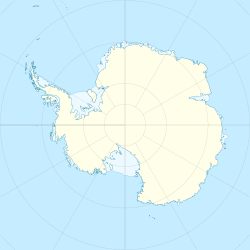Borradaile Island facts for kids
|
Location in Antarctica
|
|
| Geography | |
|---|---|
| Location | Antarctica |
| Coordinates | 66°35′S 162°45′E / 66.583°S 162.750°E |
| Archipelago | Balleny Islands |
| Length | 4 km (2.5 mi) |
| Width | 2 km (1.2 mi) |
| Administration | |
| Administered under the Antarctic Treaty System | |
| Demographics | |
| Population | Uninhabited |
Borradaile Island is a small, uninhabited island located in the cold waters of Antarctica. It is part of the Balleny Islands group. This island is famous for a very special reason: it was the first place where humans ever set foot south of the Antarctic Circle!
You can find some interesting natural features on Borradaile Island. These include a unique rock formation called Beale Pinnacle and two capes named Cape Beale and Cape Scoresby.
Contents
Discovering Borradaile Island
Borradaile Island was first discovered in February 1839. An explorer named John Balleny found the island. He named it after W. Borradaile, who was one of the merchants who helped fund Balleny's expedition.
The First Landing in the South
The very first time anyone landed on Borradaile Island was on February 12, 1839. This historic moment was achieved by Captain Freeman. He was the captain of a small ship called the Sabrina. Captain Freeman briefly landed on a small strip of land at the island's northwest corner.
This landing was a huge deal because it marked the first time any human had ever stepped onto land south of the Antarctic Circle. Imagine being the first person to explore such a remote and icy place!
After that first visit, Borradaile Island remained untouched for a long time. It wasn't until February 29, 1948, that people visited it again. A group of Australians, including Phillip Law and Stuart Campbell, landed at the same spot from a ship called HMAS Wyatt Earp.
Unique Features of Borradaile Island
Borradaile Island is about 2 nautical miles (3.7 kilometers) long and 1 nautical mile (1.9 kilometers) wide. It lies about 4 nautical miles (7.4 kilometers) southeast of another island called Young Island.
Cape Scoresby
Cape Scoresby is a tall, steep cliff at the northern end of Borradaile Island. It was mapped by scientists from the RRS Discovery II research ship between 1936 and 1938. The cape is named after the RSS William Scoresby, which was another research ship. That ship was named after a famous Arctic explorer, William Scoresby.
Beale Pinnacle
Near Cape Beale, on the southeastern side of the island, you'll find a very distinctive rock formation called Beale Pinnacle. This rock looks a bit like a boot and stands about 60 meters (200 feet) tall. Both Beale Pinnacle and Cape Beale are named after W. Beale. He was another merchant who helped fund John Balleny's expedition in 1839.
 | Madam C. J. Walker |
 | Janet Emerson Bashen |
 | Annie Turnbo Malone |
 | Maggie L. Walker |


